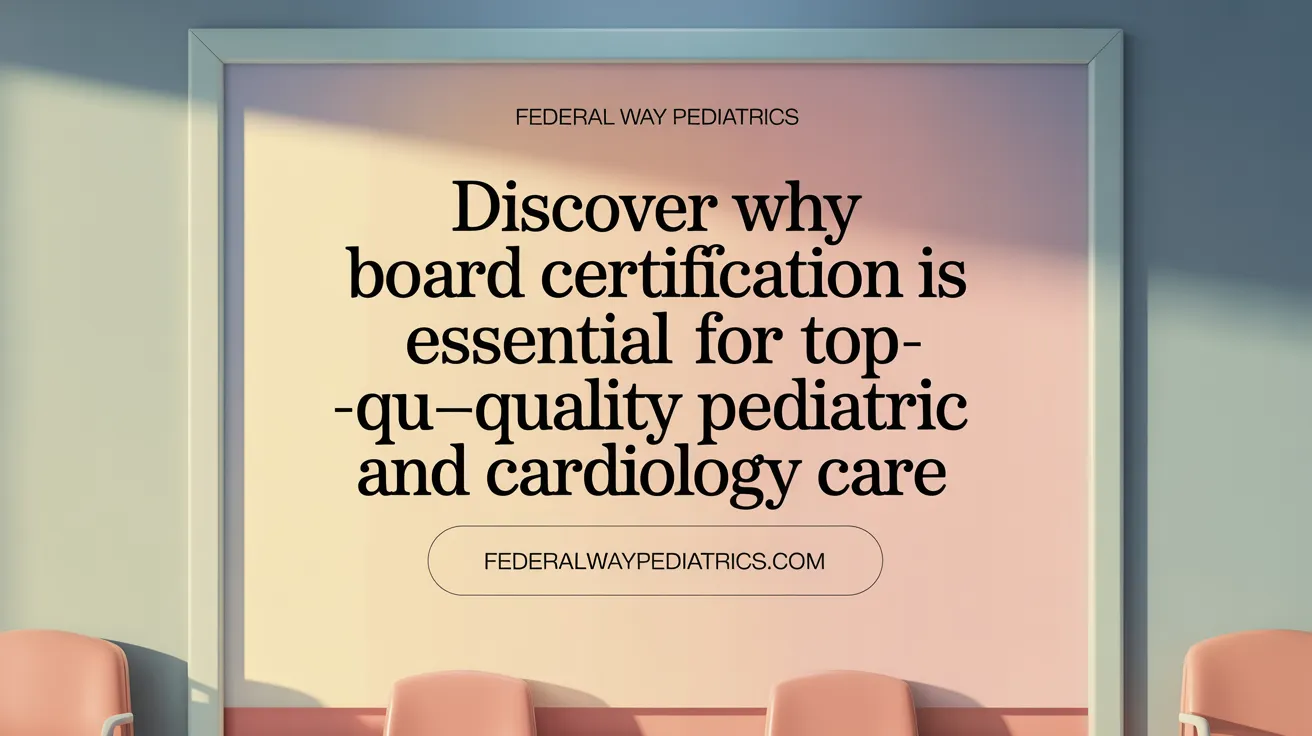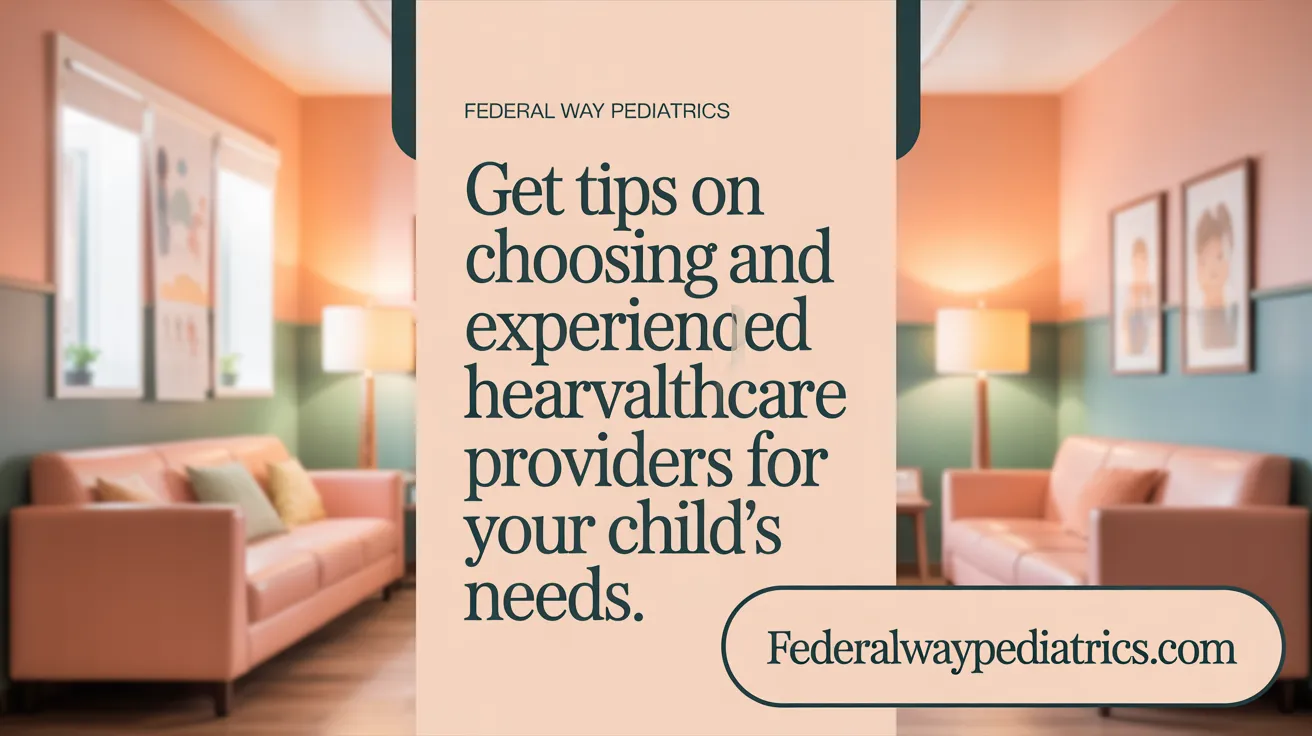Introduction to Trusted Pediatric and Cardiology Care
Choosing the right healthcare provider for your child’s general health and specialized cardiac needs is critical. Board certification is a vital benchmark indicating a physician's expertise, professionalism, and commitment to maintaining the highest standards of care. This article guides parents and patients on identifying trusted, board-certified pediatricians and cardiologists near them, understanding the significance of certification, and accessing verified directories to make informed healthcare decisions.
Understanding Board Certification: Why It Matters for Pediatricians and Cardiologists

What is the importance and benefit of board certification for pediatricians and cardiologists?
Board certification is a critical credential that confirms a physician's advanced knowledge, skills, and commitment to ongoing professional development in their specialty. For pediatricians and cardiologists, obtaining this certification involves passing rigorous exams and participating in continuous education activities. This process ensures that healthcare providers remain current with the latest medical standards and treatment techniques. Learn more about Why Board Certification Matters.
Patients can trust that board-certified pediatricians and cardiologists have demonstrated their expertise through standardized assessments and are committed to delivering high-quality care. Certification also signifies adherence to ethical practices and professional standards, which is fundamental for patient safety. See details on Verification of Certification and Physician Board Certification.
Moreover, certified physicians are often better equipped to handle complex cases because of their comprehensive training and ongoing learning. This directly impacts patient outcomes by reducing medical errors and improving treatment precision. Explore the Value of Board Certification.
Physicians benefit from recognition within their field, which can lead to increased employment opportunities, higher credibility, and professional respect. Ultimately, certification benefits the entire healthcare system by fostering a culture of excellence and continuous improvement. For more, visit About Board Certification.
How does ongoing education and recertification enhance professional standards?
Recertification and maintenance of certification (MOC) require physicians to stay updated with recent advances in medicine. This ongoing process involves periodic assessments of core competencies such as communication, professionalism, medical knowledge, and patient care. For pediatricians and cardiologists, it ensures they are familiar with new procedures, guidelines, and research findings. Learn about ABP Certification Maintenance and MOC Guidelines PDF.
This continuous learning helps prevent skill decay and encourages the integration of innovative practices. It also promotes accountability, as physicians are regularly evaluated on their competence. Additional information available on American Board of Medical Specialties Certification.
What is the impact of certification on patient safety and quality of care?
Certification acts as a quality benchmark, giving patients and healthcare institutions assurance about the competence of their providers. It reduces the risk of misdiagnosis and inappropriate treatment plans. Certified physicians are more likely to follow evidence-based practices and participate in quality improvement initiatives. Discover more from Board Certification and High Standards of Care and Board Certification Process.
Studies indicate that board-certified doctors tend to have higher patient satisfaction scores, better clinical outcomes, and lower rates of complications. They are also more familiar with managing rare or complex conditions, such as congenital heart diseases in children. For pediatric cardiology specialists, see Children’s Heart Center Nevada and Pediatric Cardiology at Renown Children's Hospital.
How does physician recognition benefit careers?
For physicians, achieving board certification opens doors to advanced career pathways, leadership roles, and specialized positions. It enhances professional reputation, helps establish a patient base, and can influence reimbursement and insurance credentials. Learn more from Benefits of Board Certification for Physicians and Achieving Physician Board Certification.
Moreover, board certification is a mark of dedication to the discipline, making physicians more competitive in the job market and often leading to increased trust and rapport with patients and colleagues alike. Explore Finding the Right Doctor and Pediatrician Board Certification Importance.
Overall, board certification is a vital component that elevates the standard of pediatric and cardiology care, securing better health outcomes for patients and rewarding physicians with professional credibility and growth opportunities.
How to Verify Board Certification Status of Pediatricians and Cardiologists
 Verifying the credentialing of pediatricians and cardiologists is an important step in ensuring quality healthcare. The most reliable way is through official certification verification tools provided by recognized organizations. The American Board of Pediatrics (ABP) offers an online verification system that allows patients and healthcare professionals to quickly confirm whether a pediatrician holds current certification. This system provides up-to-date certification statuses and helps identify if a pediatrician or pediatric subspecialist is appropriately credentialed.
Verifying the credentialing of pediatricians and cardiologists is an important step in ensuring quality healthcare. The most reliable way is through official certification verification tools provided by recognized organizations. The American Board of Pediatrics (ABP) offers an online verification system that allows patients and healthcare professionals to quickly confirm whether a pediatrician holds current certification. This system provides up-to-date certification statuses and helps identify if a pediatrician or pediatric subspecialist is appropriately credentialed.
Similarly, the American Board of Medical Specialties (ABMS) maintains a comprehensive database called CertiFacts Online. This resource enables verification of certification for various specialties, including cardiology and other subspecialties. It is highly regarded in healthcare credentialing for its rigorous standards and real-time data, ensuring the physician’s certification is active and valid.
The verification process generally involves entering the doctor’s name, specialty, and location in these online portals. Once submitted, the system provides detailed information about the physician’s certification status, including whether they are certified, recertified, or if their certification has expired.
These official sources are recognized by major healthcare quality organizations like The Joint Commission and the National Committee for Quality Assurance, making them trustworthy for both patients and credentialing agencies. Using these tools helps verify that your healthcare provider meets the high standards expected of board-certified specialists.
Overall, checking certification through the ABP and ABMS databases is the most efficient and reliable process to ensure pediatricians and cardiologists are qualified and up-to-date in their practice. It supports informed decision-making and promotes confidence in the care received.
More info search query: Board certification verification tools for pediatricians and cardiologists
| Organization | Certification Database | Certification Type Verified | Recognition | Access | Additional Notes |
|---|---|---|---|---|---|
| American Board of Pediatrics (ABP) | ABP Certification Verification System | Pediatric certification | Recognized by healthcare agencies | Online portal | Provides current certification status |
| American Board of Medical Specialties (ABMS) | CertiFacts Online | General and specialty certification | Highly credible | Online platform | Includes multiple specialties including cardiology |
| Recognized by | Standards maintained and trusted by healthcare accreditation bodies |
Professional Standards and Certification Process for Pediatricians and Cardiologists

What are the professional standards, certification processes, and credentials required for pediatricians and cardiologists?
Pediatricians and cardiologists are required to undergo extensive training and certification to meet professional standards. Both specialties start with completing medical school, earning their MD or DO degree, followed by residency programs specific to their fields. Pediatricians complete a pediatric residency, while cardiologists often pursue subspecialty training through fellowships.
For those specializing further, such as pediatric cardiologists or adult congenital heart disease experts, additional fellowship programs accredited by the Accreditation Council for Graduate Medical Education (ACGME) are necessary. These fellowships provide specialized training in handling complex pediatric or adult heart conditions.
Certification in these fields is voluntary but highly recommended. It involves passing rigorous board examinations administered by authorized certifying bodies—namely, the American Board of Pediatrics (ABP) for pediatricians and the American Board of Internal Medicine (ABIM) for many cardiology subspecialties. These exams evaluate clinical knowledge, problem-solving skills, and the competence to manage relevant medical conditions.
Maintaining certification is equally important and involves continuous professional development activities, including ongoing medical education, practice-based assessments, and professionalism evaluations. This process, known as Maintenance of Certification (MOC), ensures physicians stay current with the latest advancements and uphold high standards of patient care. Certification and recertification thus serve as vital indicators of a physician’s dedication to quality, competence, and lifelong learning in pediatric and cardiology practice.
Selecting Qualified Pediatricians and Pediatric Cardiologists for Your Child's Care

How can parents select qualified healthcare providers to address children's heart and general health needs?
Choosing the right healthcare professional for your child's health is crucial. Parents should prioritize providers who are board-certified, which confirms they have met rigorous standards of training, knowledge, and ongoing education. For cardiac concerns, it's especially important to select pediatric cardiologists with specialized training in diagnosing and treating heart conditions like congenital defects and arrhythmias.
Start by seeking recommendations from trusted friends, family, or other healthcare providers. Next, verify the credentials through reputable sources such as the American Board of Pediatrics or the American Board of Internal Medicine for specialized care. Patient reviews and ratings can provide insight into provider experiences. Meeting providers for an initial consultation helps assess communication style, understanding, and comfort levels.
Practical factors such as location, accepted insurance plans, appointment availability, and hospital affiliations also influence choice. Coordinated care between pediatricians and pediatric cardiologists ensures comprehensive management of your child's health needs, overall and specific to the heart.
What are the roles and specialties of pediatricians compared to cardiologists, and how do they complement each other in children's healthcare?
Pediatricians serve as the primary care providers for children, offering preventive health services, managing common illnesses, and guiding family health practices. They monitor growth, development, immunizations, and general wellness.
Pediatric cardiologists specialize in diagnosing and treating heart diseases in children. They perform advanced diagnostics such as echocardiograms and ECGs, and conduct procedures like cardiac catheterizations. They often work closely with pediatricians when specialized heart care or surgical intervention is necessary.
Their collaboration allows children to receive comprehensive care. Pediatricians address overall health and well-being, while cardiologists focus on complex heart issues. Together, they ensure that health management is coordinated, resulting in better outcomes for the child's total health and specifically, their heart condition.
Overview of selection considerations for parents
| Consideration | Details | Additional Notes |
|---|---|---|
| Certification | Ensure providers are board-certified in pediatrics or cardiology | Confirms advanced training and expertise |
| Experience | Look for providers with substantial clinical experience | Especially important for complex or congenital heart issues |
| Recommedations & Reviews | Seek suggestions from trusted sources; check online reviews | Could include patient ratings and comments |
| Personal Comfort | Meet in person to gauge communication and comfort levels | Trust and rapport are essential |
| Accessibility & Logistics | Location, insurance, and appointment scheduling convenience | Reduces barriers to consistent care |
| Collaborative Care | Ensure coordination between pediatrician and specialist | Promotes comprehensive health management |
Importance of certification and experience
Board certification signifies that a healthcare provider has met national standards through rigorous examinations, ongoing education, and practice assessments. For both pediatricians and pediatric cardiologists, certification ensures they are well-qualified to provide expert, up-to-date care.
Experience complements certification, especially in specialized skills needed for complex pediatric heart conditions. A combination of both increases confidence in delivering high-quality, safe treatment tailored to each child's specific health needs.
When selecting providers, verifying their certification status and years of practice helps ensure your child receives care from qualified and competent professionals dedicated to continual learning and excellence.
Accessing Reliable Directories and Resources for Board-Certified Pediatric and Cardiology Providers
 Families seeking expert pediatric or cardiology care can turn to several trustworthy resources to find certified healthcare providers. The American Board of Pediatrics (ABP) offers an online verification tool where you can confirm whether a pediatrician is certified. This database includes detailed information about credentials, certification status, and specialties, ensuring parents select qualified professionals.
Families seeking expert pediatric or cardiology care can turn to several trustworthy resources to find certified healthcare providers. The American Board of Pediatrics (ABP) offers an online verification tool where you can confirm whether a pediatrician is certified. This database includes detailed information about credentials, certification status, and specialties, ensuring parents select qualified professionals.
For cardiology specialists, the American Board of Medical Specialties (ABMS) maintains a comprehensive database that allows users to verify a doctor’s certification in various fields, including cardiovascular medicine. This resource is highly reliable and frequently updated, providing confidence in the physician’s expertise.
In addition to official certification portals, professional organizations such as the American Academy of Pediatrics (AAP) and the American College of Cardiology (ACC) offer searchable directories of their members. These directories display physicians’ credentials, practice locations, patient ratings, and areas of specialty, simplifying the process of finding qualified providers nearby.
Specialized directories, like the ACHD Clinic Directory from the Adult Congenital Heart Association (ACHA) list accredited centers and Board Certified providers who focus on adult congenital heart disease and complex pediatric cases. These lists are valuable for patients with specific needs requiring high-level subspecialty expertise.
Furthermore, many hospitals and healthcare networks provide verified provider lists on their websites. These often include patient reviews, insurance details, and appointment scheduling options, helping families make informed decisions. Combining these official and institutional resources ensures accessible, trustworthy options for finding board-certified pediatric and cardiology specialists.
Overall, using these reputable directories and tools guarantees access to highly qualified physicians committed to delivering safe, expert care for children and adults alike.
Making Informed Choices for Your Child’s Health
Board certification is essential in identifying pediatricians and cardiologists who meet high standards of clinical skill and professionalism. Utilizing verified directories and understanding certification processes empowers families to make informed health decisions. By selecting qualified, board-certified providers, parents ensure their children receive expert, comprehensive care tailored to both general wellness and specialized cardiac needs. Continuous collaboration between pediatricians and pediatric cardiologists further enhances the quality of care, prioritizing safety, trust, and positive health outcomes for every child.
